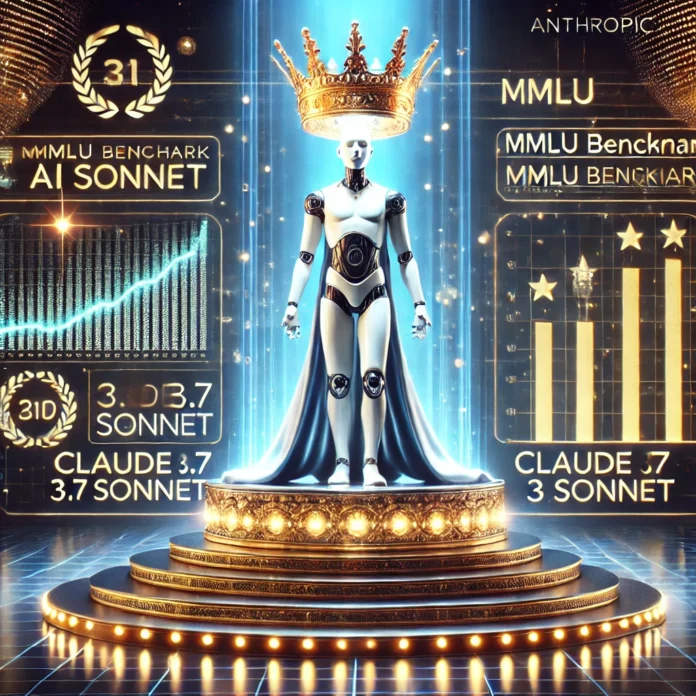Anthropic has officially claimed the top spot in the AI race with its latest language model, Claude 3.7 Sonnet, which has achieved unprecedented scores on the industry-standard Massive Multitask Language Understanding (MMLU) benchmark. Released yesterday, the model scored an impressive 97.8% on the MMLU test suite, surpassing both previous records and competitive models from OpenAI, Google, and other AI leaders.
Breaking New Ground in AI Performance
Claude 3.7 Sonnet represents a significant leap forward in AI capabilities, demonstrating exceptional performance across a range of complex tasks including logical reasoning, scientific understanding, mathematical problem-solving, and nuanced ethical questions. The MMLU benchmark, widely considered the gold standard for evaluating AI systems, covers 57 subjects ranging from elementary mathematics to professional medicine, law, and ethics.
«This achievement represents months of dedicated research focused on improving reasoning pathways and embedding deeper contextual understanding into our models,» said Anthropic’s Chief Scientist in yesterday’s announcement. «Claude 3.7 Sonnet doesn’t just memorize information—it demonstrates a genuine ability to apply knowledge across domains.»
Industry analysts note that Claude’s 97.8% score—a 2.3 percentage point improvement over its previous version—is approaching the theoretical ceiling of what’s possible on these standardized tests, as even human experts typically score around 89-94% on these evaluations.
Technical Innovations Driving Performance
Several key technological advancements contribute to Claude 3.7 Sonnet’s breakthrough performance:
- Enhanced reasoning architecture: Anthropic implemented a novel «reasoning cascade» that allows the model to decompose complex problems into manageable components before synthesizing a comprehensive solution.
- Improved knowledge integration: The model demonstrates superior ability to connect information across domains, essential for tasks requiring interdisciplinary understanding.
- Refined calibration: Claude 3.7 Sonnet shows exceptional accuracy in expressing appropriate confidence levels—knowing when it knows something and, crucially, when it doesn’t.
«What’s particularly impressive about these results is the consistency across subject areas,» noted Dr. Eliza Hernandez, AI researcher at Stanford University. «Previous models would excel in certain domains while underperforming in others, but Claude 3.7 Sonnet displays remarkable balance across humanities, sciences, and professional disciplines.»
Market Implications
Anthropic’s breakthrough comes at a critical time in the increasingly competitive AI landscape. With OpenAI expected to announce its next-generation model later this month and Google continuously refining its Gemini series, the AI capabilities race shows no signs of slowing.
Industry experts suggest this advancement could significantly impact Anthropic’s market position. The company has secured several major enterprise partnerships in recent months, including expanded relationships with Amazon Web Services and Quora, which now appear strategically timed ahead of this performance milestone.
«Companies are increasingly making AI implementation decisions based on these benchmark performances,» explained Michael Zhang, technology analyst at Morgan Stanley. «Anthropic’s timing couldn’t be better as enterprises plan their Q3 and Q4 AI integration strategies.»
Looking Beyond Benchmarks
While celebrating the benchmark achievement, Anthropic emphasized that real-world applications remain the ultimate goal. «Benchmarks provide valuable standardized measurement, but our north star is building AI systems that help people solve meaningful problems safely and effectively,» stated Anthropic’s CEO.
The company has highlighted several practical applications where Claude 3.7 Sonnet’s improved reasoning capabilities could create immediate value:
- Advanced medical research assistance
- Complex financial modeling and analysis
- Nuanced legal document review and contract analysis
- Educational support across multiple disciplines
What’s Next for AI Development
As AI systems approach or potentially surpass human-level performance on standardized tests, the industry faces important questions about future development directions and evaluation methods.
«We need new, more challenging benchmarks,» argued Dr. Hernandez. «Models are rapidly outpacing our ability to test them meaningfully. The next frontier will likely involve more creative problem-solving, long-horizon planning, and navigating truly novel situations.»
Anthropic has indicated that alongside pursuing raw performance improvements, future development will focus on safety, reducing biases, and ensuring transparent operation—addressing growing concerns about AI governance as capabilities advance.
Claude 3.7 Sonnet is now available to Anthropic’s enterprise customers and will be rolled out to other users in the coming weeks.




